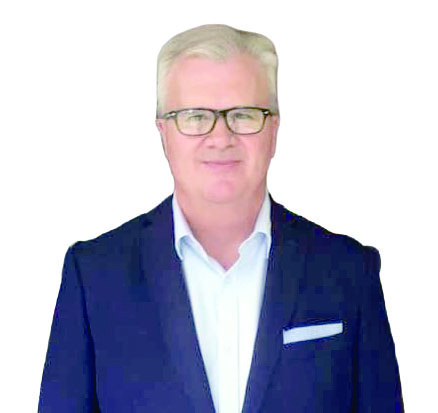Dakoda Pettigrew: American Insights — Lincoln’s pledge, and ours

The words of the Psalmist were on his mind. “If I forget thee,” Abraham Lincoln thought, speaking not at this moment of God’s Law but of the doctrine of the Declaration of Independence (the same thing anyway), “let my right hand forget her cunning. If I do not remember thee, let my tongue cleave to the roof of my mouth.”
Standing in front of Independence Hall in Philadelphia, Penn., on a brisk Friday, Feb. 22, 1861, Lincoln was living in the gravest time the Union had known since its uniting by sword, fire and principle in the summer of 1776. The Union itself was in peril, split by the specter of secession, torn by the rivalries of old and new.
At root, however, Lincoln understood that it was not so much the Union alone that was endangered, but the Union of 1776 — the Union of principle and not merely of practicality. The rebel states had united around the idea that the founding principles were for the white man alone. They spoke boldly of slavery, not as a sin against God and an inconsistency with American ideals, but as a divinely ordained and patriotic institution.
Some may have thought that the issue was not of principle but politics. Lincoln disagreed. “Soberly, it is now no child’s play to save the principles of Jefferson from total overthrow in this nation,” he declared in April 1859. The Declaration — the entire cornerstone of American democracy — was being expunged, discredited and rewritten to satisfy the designs of men who clung to the wealth, power and status of Southern slave society.
“One would start with great confidence that he could convince any sane child that the simpler propositions of Euclid are true; but, nevertheless, he would fail, utterly, with one who should deny the definitions and axioms,” Lincoln lamented in 1859.
“The principles of Jefferson are the definitions and axioms of free society. And yet they are denied, and evaded, with no small show of success. One dashingly calls them ‘glittering generalities’; another bluntly calls them ‘self-evident lies’; and still others insidiously argue that they apply only to ‘superior races.’” In front of Independence Hall, with the conspiracy to overthrow the ideals of Jefferson and the founders underway, Lincoln spoke briefly but powerfully, softly but profoundly, poignantly but optimistically about what it meant to stand where he and the nation stood on such a day of unparalleled challenge, uncertainty and consequence.
“I am filled with deep emotion at finding myself standing here, in this place, where were collected together the wisdom, the patriotism, the devotion to principle, from which sprang the institutions under which we live,” Lincoln began. “I have never had a feeling politically that did not spring from the sentiments embodied in the Declaration of Independence. I have often pondered over the dangers which were incurred by the men who assembled here, and framed and adopted that Declaration of Independence. I have pondered over the toils that were endured by the officers and soldiers of the army who achieved that Independence. I have often inquired of myself what great principle or idea it was that kept this Confederacy so long together.
“It was not the mere matter of the separation of the Colonies from the motherland; but that sentiment in the Declaration of Independence which gave liberty, not alone to the people of this country, but, I hope, to the world, for all future time. It was that which gave promise that in due time the weight would be lifted from the shoulders of all men. This is the sentiment embodied in that Declaration of Independence.”
What should we do? That had been the question since December, when South Carolina declared independence, urging other states to join what it called a “confederacy of slave-holding states.”
Lincoln answered on this day with a question of his own, and the doctrine of the Declaration was at the forefront.
“Now, my friends, can this country be saved upon that basis?” he said. “If it can, I will consider myself one of the happiest men in the world if I can help to save it. If it can’t be saved upon that principle, it will be truly awful.”
They were simple words but carried significant meaning. America was at a crossroads — the crossroads of its existence. The people could either surrender the very ideals that conceived and birthed the country, or it could stand firm in what Lincoln called the “ancient faith” that all are created equal, endowed with natural rights, and that legitimate government flowed from the consent of the governed and not by the will of tyrants, be they crowned on a throne or exalted in a parliament.
“I have said nothing but what I am willing to live by, and, in the pleasure of Almighty God, die by,” Lincoln concluded.
To stand by the Declaration, in life and in death, in war and in peace — that was his pledge.
For Lincoln, the Declaration was a living document, not a dead relic. It spoke beyond 1776 not of a reality but of an ideal, not of passivity but of action, not of newness but of the immutable law of God and nature.
Its words, he told Stephen Douglas in 1858, “meant to set up a standard maxim for free society which should be familiar to all: constantly looked to, constantly approximated, and thereby constantly spreading and deepening its influence and augmenting the happiness and value of life to all people, of all colors, everywhere.”
On Tuesday, Feb. 12, 1878 — what would have been Abraham Lincoln’s sixty-ninth birthday — James Garfield, then a congressman and future president, said: “I doubt if history affords any example of a life so early, so deeply, and so permanently influenced by a single political truth, as was Abraham Lincoln’s by the central doctrine of the Declaration — the liberty and equality of all men.”
Let us live such lives that the same might one day be said of us. Let it be said that in times of peace, we held to the Declaration. Let it be said that in times of strife and turmoil, we held to the Declaration. Let it be said that when others chipped away at its meaning — excluding group after group from its universal promises — we held to the Declaration.
And, let it be said that we did so with grace, not pride or anger; with strength rooted in justice, not vengeance; and with heart, soul, and steps aimed toward the promised land—a land finally at peace with its better self, its highest ideals more realized than ever.
Dakoda Pettigrew is a summa cum laude graduate of Liberty University with a Bachelor’s of science in political science and history.
Pettigrew’s father went to school in Cassville, and he lives in Tennessee. He can be reached at pettigrewdakoda6@ gmail.com.






